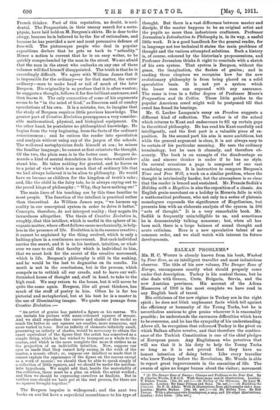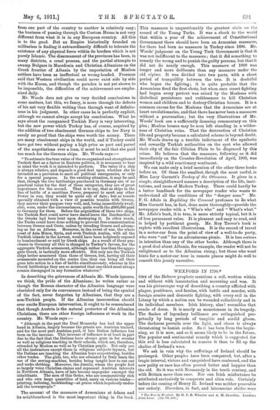BALKAN PROBLEMS.*
Mn. H. C. WOODS is already known from his book, Washed by Four Seas, as an intelligent traveller and most industrious observer. The title of his new volume, The Danger Zone of Europe, encompasses exactly what should properly come under that description. Turkey is his central theme, but he also deals with Greece, Crete, Bulgaria, Servia, and the new Austrian provinces. His account of the Adana Massacres of 1909 is the most complete we have read in any English book of travel.
His criticisms of the new regime in Turkey are in the right spirit ; he does not blink unpleasant facts which tell against the efficiency or humanity of the Young Turks, but he is nevertheless anxious to give praise wherever it is reasonably possible ; he understands the enormous difficulties which have to be overcome, and he has the sympathy of his understanding. Above all, he recognises that reformed Turkey is the pivot on which Balkan affairs revolve, and that therefore the continu- ance of the Turkish Constitution is one of the chief pledges of European peace. Any Englishman who perceives that will see that it is his duty to help the Young Turks so long as it is not proved that they have no honest intention of doing better. Like every traveller who knew Turkey before the Revolution, Mr. Woods is able to report great improvements in the amenities of life. The swarm of spies no longer buzzes about the visitor; movement • (1) The Danger Zone of Europe : Changes and Problems in the Near Bast. By H. Charles Woods, F.B.G.S. With three maps and 52 illustrations. London : T. Fisher lJnwin. [10s. 6d. net.]—(2) Turkey of the Ottomans. By Lucy X. Garnett. London : Sir base Pitman and Sons. [6s. net.]—(3) Evading the Crescent. By F. G. Adak:. With 24 illustrations from photographs and a map. London : Martin Seeker. [10e. 6d. net.]—(4) Mg Balkan Tour. By Roy Trevor. With a photogravure frontispiece, a map, and IAA other illustrations. London : Jobn Lane. [21s. net.1 from one part of the country to another is relatively easy; the business of passing through the Custom House is not very different from what it is in any European country. All this is to the good. But an Empire historically founded on militarism is finding it extraordinarily difficult to tolerate the existence of any physical force within its borders which is not purely Islamic. The disarmament of the provinces has been, in many districts, a cruel process, and the partial attempts to swamp Bulgars in Macedonia and Christian Albanians on the Greek frontier of Albania by the importation of Moslem settlers have been as ineffectual as wrong-headed. Freeman said that Western civilisation could never exist side by side with the Koran, and though the paradox is not yet shown to be impossible, the difficulties of the achievement are empha- sized daily.
Mr. Woods does not give us very decided conclusions in some matters, but this, we fancy, is more through the defects of his not very flexible writing than through want of definite- ness in his judgment. In other cases he is perfectly explicit, although we cannot always accept his conclusions. What he says about the reorganised Turkish Navy is very interesting, but the new power which Turkey has, of course, acquired by the addition of two obsolescent German ships to her Navy is surely no proof that the ships were worth the money. There are many obsolescent ships in the world, and if Turkey could have got two without paying a high price as part and parcel of the negotiations over a loan, it must be said that she paid too much for the German ships. Mr. Woods says:— " To estimate the true value of the re-organised and strengthened Turkish fleet as a factor in Eastern politics, it is necessary to bear in mind the work it is intended to perform. The value of a ship is always relative, and depends a good deal upon whether she be intended as a provision to meet all political emergencies, or only for a special purpose. In the existing situation, it may be said that, though the two battleships purchased in Germany are of no practical value for the first of these categories, they are of great importance for the second. That is to say, that as ships in the line of battle of a maritime Power, prepared to meet any other Power in war, they would be quite out of date ; but as vessels specially obtained with a view of possible trouble with Greece, they answer their purpose very well, and, being immediately avail- able, were, under the circumstances, quite worth the .8900,000 paid to Germany for them. Before the acquisition of these two ships, the Turkish fleet could never have dared leave the Dardanelles if the Greeks had been bent upon destroying it. In other words, the Turks could have done nothing to prevent free communication between Greece and Crete, unless by invading Greece and advanc- ing as far as Athens. Moreover, in the event of war, the whole coast of Asia Minor, Syria, and even Turkish Arabia, with all the Turkish islands in the Levant, would have been helplessly exposed to bombardment or raid by Greek ships. As a result of these pur- chases in Germany all this is changed in Turkey's favour, for the aggregate Turkish armament, although rather less than the aggre- gate Greek, is tactically more effective. Not only are the Turkish ships better armoured than those of Greece, but, having all their armaments mounted on the centre line, they can bring all their guns into action in a line of battle simultaneously, whereas in the Greek battleships they are so mounted that one-third must always remain disengaged in any formation whatever."
In describing the grievances of Albania Mr. Woods ignores, we think, the pride of the Albanians ; he writes rather as though the Roman character of the Albanian language were cherished only for its convenience instead of being the symbol of the fact, never forgotten by Albanians, that they are a non-Turkish people. If the Albanian insurrection should ever excite European intervention, it ought to be remembered that though Austria is the natural protector of the Albanian Christians, there are other foreign influences at work in the country. Mr. Woods says :- " Although in the past the Dual Monarchy has had the upper hand in Albania, largely because the priests are Austrian trained, and for the most part Austrian paid, of late Italian influence has been on the increase. This increase of influence is at least in part due to the fact that the Italians have always gone in for secular as well as religious teaching in their schools, which are, therefore, attended by Moslem as well as by Christian pupils. Not only are all the instructors except those in religious subjects laymen, but the Italians are teaching the Albanian boys carpentering, besides other trades. The girls, too, who are educated by Italy learn the use of the sewing-machine, besides being taught how to cut out and make clothing. Moreover, the Jesuits, whom the people feel so largely voice Christian Maims and represent Austrian interests in Northern Albania, have of late become unpopular amongst the inhabitants. The men of this Order, who are comparatively rich and who own large quantities of land, carry on various trades— printing, tailoring, bookbinding—at prices which hopelessly under- sell the townspeople."
The account of the massacre of Armenians at Adana and its neighbourhood is the most important thing in the book.
This massacre is unquestionably the greatest stain on the record of the Young Turks. It was a shock to the world that within a year of the achievement of Constitutional Government there should have been an Armenian massacre, for there had been no massacre in Turkey since 1896. Mr. Woods' judgment on the Young Turk Government is that it was not indifferent to the massacre ; that it did something to remedy the wrong and to punish the guilty persons, but that it did not do nearly enough. This massacre of 1909 was longer and more deliberate than any massacre under the old regime. It was divided into two parts, with a short period of tranquillity between the two. It is doubtful who began the fighting ; it is quite probable that the Armenians fired the first shots, but when once street fighting had begun every pretext was seized by the Moslems with diabolical persistence and ruthlessness to kill Christian women and children and to destroy Christian houses. It is a common excuse for the Moslems that the Armenians are at heart revolutionaries, and that there has never been a massacre without a provocation; but the very illustrations of Mr. Woods' book are a sufficiently damning commentary on this plea ; Moslem houses may be seen left standing in a wilder- ness of Christian ruins. That the destruction of Christian life and property became a calculated scheme is beyond doubt. Mr. Woods draws up a terrible indictment of the apathetic and cowardly Turkish authorities on the spot who allowed their city of the fair Cilician Plain to be disgraced by this crime. He believes that the massacre, following as it did immediately on the Counter-Revolution of April, 1909, was inspired by a wild reactionary sentiment.
We can make only a brief mention of the other three books before us. Of these the smallest, though the most useful, is Miss Lucy Garnett's Turkey of the Ottomans. It gives in a simple, straightforward manner a description of the life, insti- tutions, and races of Modern Turkey. There could hardly be a better handbook for the newspaper reader who wants to understand all the conditions of the " danger zone." Mr. F. G. Aflalo in Regilding the Crescent professes to do what Miss Garnett has, in fact, done more thoroughly—provide the newspaper reader with a "Who's who" and " What's what." Mr. Aflalo's book, it is true, is more strictly topical, but it is of less permanent value. It is pleasant and easy to read, and is helped by pertinent gossip. Mr. Roy Trevor's book is replete with excellent illustrations. It is the record of travel in a. motor-car from the point of view of a well-to-do party, who were " out" for an adventurous picnic. It is less serious in intention than any of the other books. Although there is a good deal about Albania, for example, the reader will not be enlightened as to the Albanian rising; but those who want hints for a motor-car tour in remote places might do well to consult this jaunty narrative.











































 Previous page
Previous page